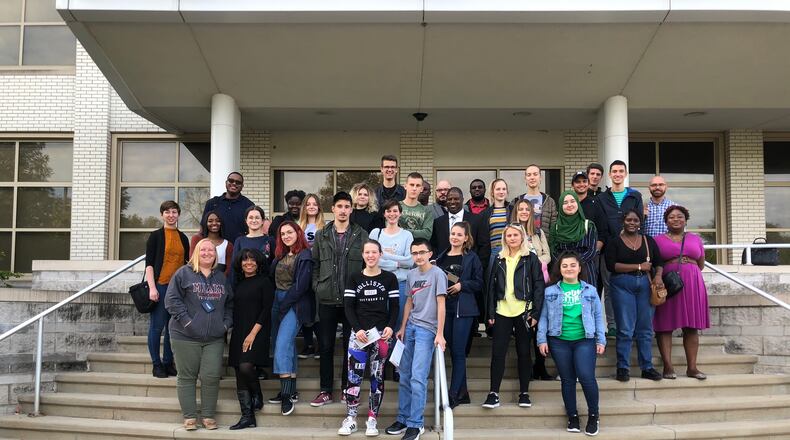>> AMELIA ROBINSON: The two times I thought my brother was going to die
Most wore blue jeans. One girl rocked a USA sweatshirt.
They all spoke perfect English through pronounced Bosnian, Croatian or Serbian accents. Without the accents, you’d think these kids were from Dayton, Centerville, Bellbrook …
The 16- and 17-year-olds kidded with each other and exchanged inside jokes adults could not begin to understand. They mingled with the handful of students from Stivers High School and Central State University at the mini-camp.
It was exactly what the teen years should look like.
The Dayton Mediation Center, with help from the Dayton Sister City Committee, brought 18 Bosnian students to town thanks to a U.S. State Department grant for the Four Cities Youth Leader Academy. During their stay, they visited several Dayton organizations.
RELATED: Dayton is more connected than ever. But will it remain that way?
Listening to these smart and wickedly talented kids, it was hard to imagine that if not for the peace accords reached at Wright-Patterson Air Force Base in 1995, they might not exist. Their parents might not exist.
It is hard to imagine that kids just like these kids ran from or fired bullets from weapons similar to the one used to kill nine in our very own Oregon District on Aug. 4.
The fear that gripped their country in the ’90s was the result of civil war.
The circumstances may be different, but the fear that grips ours is the result of a “civil war” as well.
We are firing on ourselves.
An average 100,120 people are injured by gun violence a year in the United States, according to a study by the Everytown for Gun Safety Support Fund. Another 36,383 are killed, according to the nonprofit that advocates for gun control and against gun violence.
>> AMELIA ROBINSON: Are you over it?
I visited Sarajevo, the capital of Bosnia and Herzegovina, in 2012 as part of the Dayton Sister City Committee delegation. Our visit came 17 years after the Dayton Peace Accords ended the brutal civil war that saw 100,000 people perish between 1992 and 1995.
You could see bullet holes. The effects of all that bloodshed still lingered then, and I’m told still does today. But the positive impact of the imperfect peace agreement reached in Dayton could be felt in the historically rich country.
What would have become of the kids who visited my newsroom the other day if an accord had not been reached? What would have happened to their dreams, talents and passions? Their drawing, podcasting and writing?
The Dayton Peace Accords also left an impact on Dayton, even though some may overlook it.
There are obvious things like the The Dayton Literary Peace Prize and the Dayton International Peace Museum, both of which honor the 1995 Dayton Peace Accords that made the shooting in Bosnia stop.
The American civil war that has led to gun violence on our streets and in our homes, churches, schools and big-box stores continues mostly unchecked.
There is something about Dayton when it comes to getting things done. They say there may be something in the water here, when it comes to our creativity and innovation. Maybe that something can help lead to a ceasefire in America like it did in Bosnia.
Former NFL player Chris Borland, a Kettering native, pushed for the recent Peace Festival at the Peace Museum, which included panel discussions on mental health and gun violence. The message was clear: the bloodshed can be stopped.
DAYTON STRONG: The people who raised $5 million this summer for victims of the mass shootings and tornadoes
With all the blood that has been shed in America, a perfect solution will not be easy to reach.
But we have to try.
The next generation of American kids in blue jeans and USA sweatshirts don’t deserve to live in a war zone.
GET INVOLVED
Four Cities Young Leader Academy Exhibition Night is scheduled for 5 to 7 p.m. Monday, Oct. 28 at the Dayton Metro Library downtown.
Students will give a public presentation about how they can make a positive impact on their communities.
About the Author
